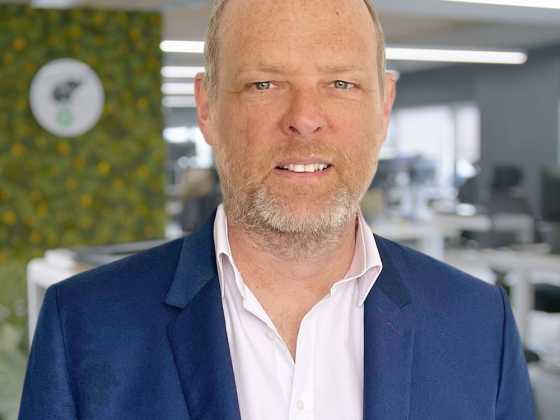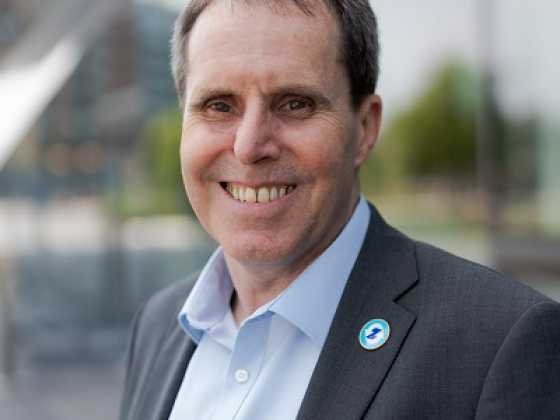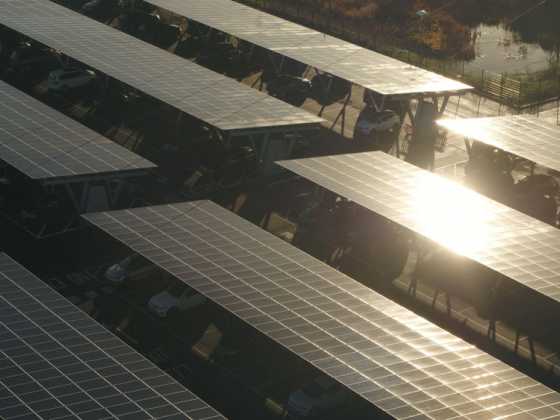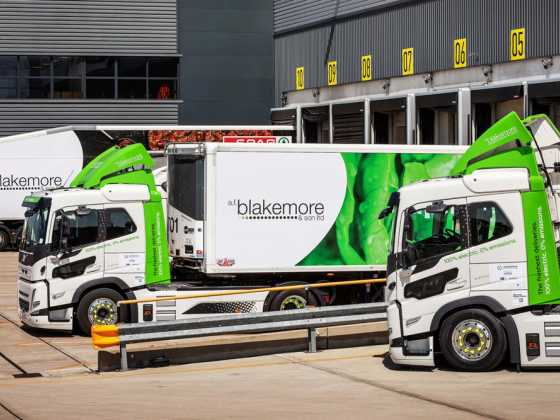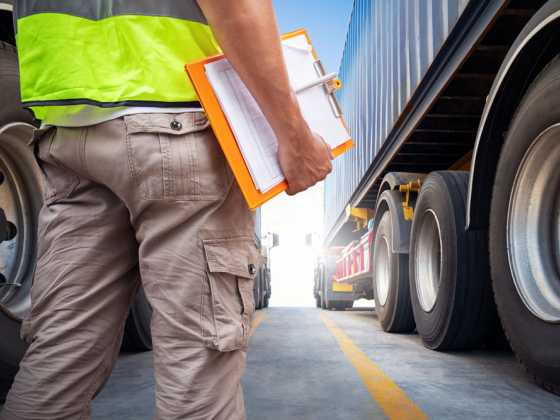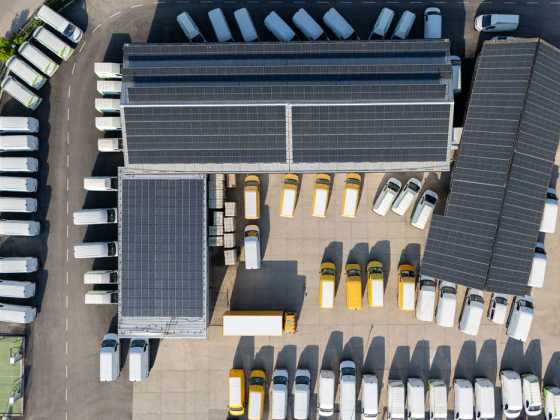Building the UK’s biggest e-cargo bike fleet

Pauline Potter, director of procurement and sustainability at Evri, shares how the company is electrifying its fleet as part of an ambitious decarbonisation strategy.
Ever since we introduced our first low-carbon biomethane compressed natural gas (CNG) truck and electric vans in London in 2018, we’ve been on a mission to build one of the most sustainable fleets in the industry.
Our decarbonisation journey truly picked up pace when we launched our ambitious, wide-ranging ESG strategy in 2021, just ahead of the rebrand from Hermes UK to Evri. This ongoing initiative harnesses significant investment in fleet, buildings and innovation, and encompasses a host of stakeholders – from colleagues, senior management, drivers and couriers to suppliers and retail partners.
As a responsible carrier, currently delivering more than 730 million parcels a year, it’s no surprise that this is a fundamental focus for the business, and we’ve set a target of achieving net zero for direct and indirect carbon emissions by 2035.
One area in which we’ve been making a real difference in the past 12-18 months is the final mile, which involves moving a parcel from a local transportation hub to its destination. The use of electric bikes – e-cargo bikes – to deliver parcels in towns, cities and other busy urban areas has become a key element of our decarbonisation strategy.
Our zero-emission bikes are a key part of the groundwork for Evri to dial up on its ambition to become the UK’s most sustainable parcel carrier. There are other benefits for our customers and their communities too. The bikes also reduce noise pollution and congestion as the space-efficient design allows them to navigate the city streets easier and deliver an often-quicker service to customers.
Evri is committed to making a positive impact on the environment and delivering a sustainable future. Our multi-year ESG plans represent a significant leap forward, and we are confident that these initiatives will propel us towards our net-zero goal.
Zero emissions in the final mile
Our e-cargo journey began in early 2022 when we trialled this delivery model in Driffield, East Yorkshire.
We knew e-cargo bikes had long presented a sustainable delivery solution but many bike designs were limited by capacity. However, the EAV bike we trialled had a respectable 2m3 (2,000-litre) capacity, and was able to carry upwards of 130 parcels. Initial results showed an increase in productivity of around 13 per cent and up to 100 per cent reduction in tailpipe CO2 emissions – a very real proof of concept that could aid in the decarbonisation of the final mile.
Fast-forward two years and we’ve just announced a £19 million investment in our electric fleet, including a fast-tracked rollout of e-cargo bikes.
We plan to grow the bike fleet from 33 to 99 in the next year, and to 3,000 within a decade. To help achieve this, we’ve set up a dedicated ‘final-mile electrification task force’, which will explore innovative solutions, establish partnerships and implement key initiatives to deliver on our strategy.
We already operate e-cargo bikes in London, Bristol, Cambridge and Oxford – in the latter city, we partnered with local cargo bike delivery firm Pedal & Post earlier this year to provide carbon-free deliveries to consumers’ homes within Oxford’s zero-emission zone. We now deliver 1.5 million parcels a year by bike or EV (electric vehicle) and aim to triple this number to around 4 million over the next 12 months.
A single parcel delivery by e-cargo bike can produce up to a 200g carbon saving, and increasing the number of bike deliveries to 4 million could equate to carbon savings comparable to driving more than 400,000 miles.
Further electrification
This investment puts us in a great position as we enter the Electric Fleet Race, which is gathering serious momentum just six months after its launch. And we’re not only focused on e-cargo bikes – our fleet of electric vans is getting a major boost as well.
Currently, we have 168 EVs, making up around 37 per cent of our total van fleet. They primarily serve Evri ParcelShops.
Based in independent shops, selected Tesco Express stores and Post Office branches, ParcelShops offer a more most carbon-efficient way to send, receive and return a parcel, compared to a residential/workplace address delivery or pick-up. Consolidating collections via ParcelShops and self-serve Lockers also means less time spent on the roads.
Our aim is to service our entire out-of-home estate – currently the largest in the UK at over 15,000 locations – with EVs at the earliest opportunity.
As part of our diesel phase-out, we plan to add 148 EVs to the fleet in time for this year’s busy peak period in the run up to Christmas, with an additional 122 to join in spring 2025. To support our growing electric fleet, we’ve invested £1 million across our depots and hubs to expand EV-charging infrastructure.
This builds on previous electrification progress we’ve made. Last September, we trialled two electric HGVs at our Rugby site to reduce emissions in the first and middle miles, traditionally the toughest parts of the parcel journey to decarbonise mainly due to range limitation. Last October we ordered a DAF XB eHGV, with a range of up to 350km.
It can go from a 20 per cent to 80 per cent charge in less than 70 minutes and was in operation ahead of the Christmas peak.
Looking to the future
Our investment in electrification aligns with wider efforts we’re making in the ESG space and decarbonisation. For example, last year we brought in 30 new bio-CNG tractor units, bringing the total to 202, which accounts for 52 per cent of our core HGV fleet.
Each unit reduces CO2 emissions by up to 84 per cent when compared to an equivalent diesel vehicle.
Alternative fuel exploration is ongoing, and we successfully trialled a hydrogen HGV in 2023. We also use hydrotreated vegetable oil (HVO) as standard at our Brooklands depot in Surrey, and we’ve updated the company car policy so that all new cars must be hybrid or electric.
We’ll be keeping a close eye on current and emerging models to make sure we adopt at the right time to meet operational needs. We are not just investing in technology, but also in our people, empowering them to be part of the solution. Together, we can build a more sustainable future for the parcel delivery industry, as well as the communities we serve.
In 2023-24, overall, we emitted an average of 370g of CO2 per parcel, which is a 21 per cent reduction YOY. Decarbonisation is a challenging process, and we know there’s a long way to go. But we are making strong progress as we continue to deliver our vision of reaching net zero by 2035 – one truck, van and bike at a time.

